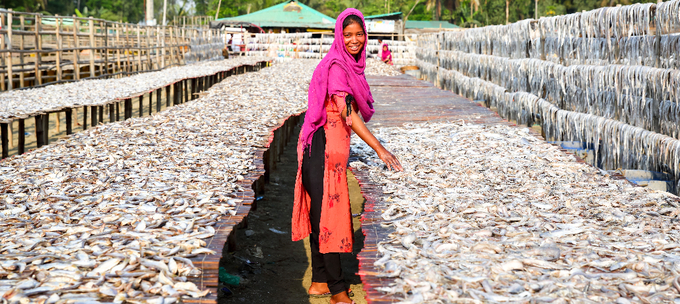November 23, 2025 | 11:19 GMT +7
November 23, 2025 | 11:19 GMT +7
Hotline: 0913.378.918
November 23, 2025 | 11:19 GMT +7
Hotline: 0913.378.918

Small-scale fisheries produce 40 percent of all the fish we eat. They are small in name, but not in value! Yet, many small-scale fishers and fish workers suffer from poverty and marginalization, work under substandard conditions, experience high fatality rates and suffer occupational safety and health risks.
The Food and Agriculture Organization of the United Nations (FAO), the Vatican and the Catholic maritime charity, Stella Maris, today marked World Fisheries Day with a call for greater social protection for small-scale fishers and fish workers.
As the International Year of Artisanal Fisheries and Aquaculture (IYAFA 2022) draws to a close, FAO, the Holy See and Stella Maris held a high-level event entitled “Investing in social protection to secure equitable Blue Transformation in the fisheries sector,” at FAO’s headquarters in Rome.
FAO Director-General, QU Dongyu, said many people employed in the fisheries sector had limited access to finance and insurance, safety networks and social programmes to help them survive and prosper.
“Small-scale fisheries produce 40 percent of all the fish we eat,” Qu said. “They are small in name, but not in value! Yet, many small-scale fishers and fish workers suffer from poverty and marginalization, work under substandard conditions, experience high fatality rates and suffer occupational safety and health risks.”
The hybrid event reflected on the devastating impact of the COVID-19 pandemic, climate shocks and economic challenges to the fisheries sector and the need to protect fishers and their rights. During the pandemic, value chains were disrupted, jobs were lost and fishing stopped altogether in many countries because of COVID-19 restrictions.
Qu said social protection and labor market interventions had been the single most important policy response to address the socio-economic impacts of COVID-19. Social support enabled households to invest in education and youth employment, he added.
FAO’s Voluntary Guidelines for Securing Sustainable Small-Scale Fisheries in the Context of Food Security and Poverty Eradication, endorsed in 2014, are a call to action, Qu said.
In his address, Cardinal Michael F. Czerny, the Prefect of the Vatican’s Dicastery for Promoting Integral Human Development, urged Member States to implement the FAO guidelines and called on participants to challenge governments and other parties to improve management and governance.
Participants discussed the need for greater coherence between social protection and fisheries policies to support social development and equitable sustainable fisheries management.
The event shared ideas and recommendations to contribute to sustainable development and equitable Blue Transformation – bringing together these goals to promote social and economic development as well as fisheries sustainability.
The 2021 Committee on Fisheries (COFI) Declaration for Sustainable Fisheries and Aquaculture calls on States to facilitate access to social protection programmes for fishers and aquaculture producers and their communities.
(FAO.org)

(VAN) In a new study published in Trends in Biotechnology, researchers used a gene-editing technology called CRISPR to increase a fungus's production efficiency and cut its production-related environmental impact by as much as 61%- all without adding any foreign DNA.

(VAN) A top official in Beijing’s Cop delegation says China is committed to clean energy – but US’s absence is a problem.

(VAN) The Bangsamoro region’s inflation rate rose slightly to –1.3 percent in October 2025 from –1.5 percent in September, the Philippine Statistics Authority (PSA-BARMM) reported.

(VAN) FAO-led report says protecting and restoring forests is crucial to boosting climate-resilient agriculture, rural livelihoods and global food and water security.

(VAN) Flagship partnership secures additional GBP 16.9 million to strengthen forest monitoring, transparency and country support to 2030.

(VAN) After a turbulent year for international development, the aid and assistance landscape has shifted, with donors rethinking how, where and why they support sustainable development.

(VAN) A new tool for measuring the economic value of farm animal welfare improvements has been developed, potentially transforming how consumers, retailers and the government evaluate animal welfare policies.